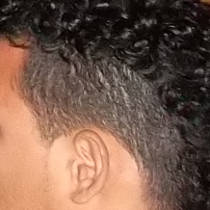The Differences Between Scalp Psoriasis and Seborrheic Dermatitis

How can I tell whether I have scalp psoriasis or seborrheic dermatitis? What symptoms do these two diseases share and how are they different? If you've been asking yourself these questions, you have come to the right place for answers. The purpose of this article is to outline the common characteristics of seborrheic dermatitis and scalp psoriasis as well as the key factors that make them different. We also touch upon some common remedies for these skin diseases, including nutritional therapy for scalp psoriasis and biotin for seborrheic dermatitis in infants.
Both psoriasis and seborrheic dermatitis (also known as seborrhoea and seborrheic eczema; in infants, it is also known as cradle cap) are common skin conditions. Scalp psoriasis is a subtype of psoriasis that occurs on the hair-covered areas of the head. As seborrheic dermatitis typically affects the scalp as well, it may be difficult to tell it apart from scalp psoriasis. The two disease also share similar symptoms — including itchy, red, scaly skin — which makes it even harder to distinguish between the two.
Seborrheic Dermatitis vs Scalp Psoriasis: Symptoms and Signs
Luckily, the two disease also differ in many aspects, and with a simple visual examination of the scalp, your doctor should be able to make a diagnosis. While you should leave the ultimate diagnosis to your doctor, you can get an idea of the differences between scalp psoriasis or seborrheic dermatitis by studying the table below.
Seborrheic Dermatitis
- Redness of the skin (not in all cases)
- Greasy skin covered with flaky white or yellowish scales that may attach to the hair shaft
- Patchy scaling or thick crusts, usually confined by hairline
- Bleeding may occur when patches are removed
- Itching of the scalp
- Soreness of the scalp
- Can also affect your face, back, chest and other areas of your body that have many oil glands
Scalp Psoriasis
- Visible red patches covered with silvery scales
- Silver-white scales (layers of dead skin cells) that may attach to the hair shaft
- Patchy scaling or thick crust which may extend beyond hairline
- Bleeding may occur when patches are removed
- Itching of the scalp
- Soreness of the scalp
- Scalp psoriasis affects the hair-covered areas of the head, but regular psoriasis can affect other parts of the body as well
Seborrheic Dermatitis: Treatment and Remedies
The treatment for seborrheic dermatitis includes dandruff shampoos, over-the-counter antifungal creams, avoidance of harsh soaps and detergents, and anti-itching creams applied topically to the affected area. Foods high in biotin, or vitamin B7, might also help alleviate symptoms, at least in infants: one study reported that nursing infants with cradle cap (the infant version of seborrheic dermatitis) improved when foods rich in biotin, such as liver and egg yolk, were added to the mother's diet. However, further studies are warranted before any recommendations can be made with regard to the use of biotin as a remedy for seborrheic dermatitis.
Scalp Psoriasis: Treatment and Remedies
If your psoriasis is severe, your doctor may prescribe you topical or oral medications. Also phototherapy — the use of UV light as a treatment — is sometimes used as a remedy. In mild cases of scalp psoriasis, tar products and salicylic acid are commonly used as a treatment, and over-the-counter tar shampoos targeting the scalp are on the market. In your psoriasis involves only a few areas, your doctor may also decide to inject the scalp lesions with steroid medications. If you are looking for a more natural way to treat your psoriasis, you should get familiar with our Nutrition Guide to Healing Psoriasis Naturally.

